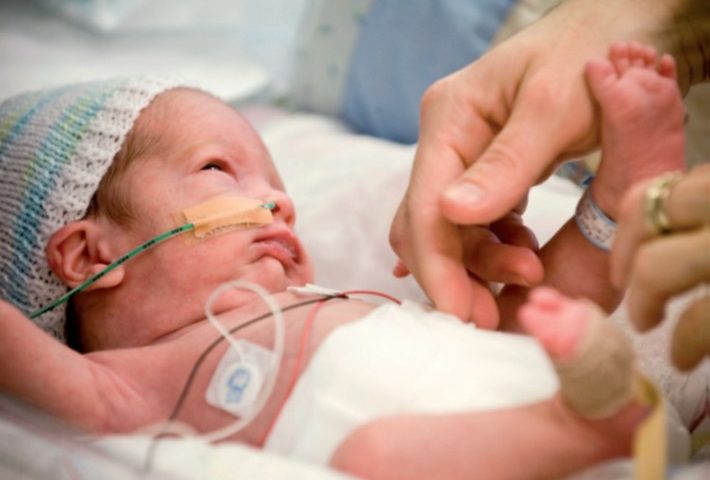A growing body of evidence suggests that the preterm infants’ risk for adverse neurodevelopmental outcomes may in part stem from physical stressors and prolonged maternal separation experienced during the stay in the neonatal intensive care unit (NICU) (Montirosso & Provenzi, 2015), as the immature brain of a preterm infant is particularly vulnerable to the quality of experience (Lupien, McEwen, Gunnar, & Heim, 2009). Furthermore, preterm infants in incubators cannot experience the earliest mother-infant interactions which play a crucial role in early regulation of stress response and provides foundations for the development of well-functioning affective relationships and healthy developmental outcomes (Feldman, 2007). Studies focused on the quality of care given to preterm infants in the NICUs have shown that parent-preterm infant closeness during hospitalization enhance neurobehavioral outcomes. However, very few studies have focused on parents’ spontaneous behaviors with their infants in the NICU, observing caregiving routines before discharge, and no study has focused on parents’ communicative behaviors addressed to the preterm infant in incubator and the latter’s responses.
Our longitudinal research project is aimed to examine (a) whether preterm infants can contingently coordinate behavior with mother and father in spontaneous communication in the Neonatal Intensive Care Unit (NICU); (b) whether mother-infant vs. father-infant engagement and contingency differ; (c) whether paternal/maternal emotional conditions and/or infant perinatal risk factors are related to the quality of mother-infant and father-infant interaction; and (d) whether the quality of mother-infant and father-infant interaction in the NICU predicts the quality of their interaction at 4 months of corrected age. The parents of 20 preterm infants (60% girls, born 27-33 weeks) were recruited through the NICU of Verona hospital. Parents completed self-report questionnaires measuring depressive symptoms and marital quality in the NICU, and then at 4 months corrected age (c.a.). Fathers were interviewed during the infants’ hospital stay. Each parent was observed during face-to-face communication with the infant in the incubator in the NICU, and then at 4 months c.a.. All dyadic interactions were videotaped and father’s/mother’s and infant gaze, touch, facial and vocal affect were coded on a 1s time-base using the Infant and Parent Engagement coding scales devised by Lavelli and Beebe (2016). The same coding scales were used with the “NICU” sample of mother-preterm infant dyads at the hospital of Columbia University-NY, in order to compare the two samples of Italian and US dyads. The dynamic of father-infant and mother-preterm infant communication was first analysed through sequential analysis and then using multilevel time-series models.
Keywords
preterm infants, parents of preterm infants, Neonatal Intensive Care Unit (NICU), psychological distress, father-infant vs. mother-preterm infant interaction, contingent coordination
Principal Investigator
Manuela Lavelli, University of Verona and Alberto Stefana. All data were collected by Alberto Stefana during his doctoral track
Project Participants
- Beatrice Beebe, NYSPI, Columbia University, New York
- Paolo Biban, Neonatal and Pediatric Intensive Care Unit, University Hospital of Verona
- Manuela Lavelli, University of Verona
- Sang Han Lee,Nathan Kline Institute, New York
- Ezio Maria Padovani, Neonatal and Pediatric Intensive Care Unit, University Hospital of Verona
- Alberto Stefana, PhD at University of Verona, currently at University of Brescia
Duration
60 months (November 2015- October 2020)
Current State
Data collection and data analyses accomplished; part of results already published; other publications under review and in preparation.
Publications
Lavelli, M., Stefana, A., & Lee, S. H., & Beebe, B. (under review). Preterm infants contingent communication in the NICU with mothers vs. fathers. Developmental Psychology.
Stefana, A., Padovani, E. M., Biban, P., & Lavelli, M. (2021, accepted). Fathers’ experiences of supporting their partners during their preterm infants’ stay in the neonatal intensive care unit: A multi-method study. Journal of Perinatology.
Cena, L., Biban, P., Janos, J., Lavelli, M., Langfus, J., Tsai, A., Youngstrom, E. A., & Stefana, A. (2021). The collateral impact of COVID-19 emergency on neonatal intensive care units and family-centered care: Challenges and opportunities. Frontiers in Psychology, Health Psychology section, 12:630594. https://doi.org/10.3389/fpsyg.2021.630594.
Stefana, A., Lavelli, M., Rossi, G., & Beebe, B. (2020). Interactive sequences between fathers and preterm infants in the Neonatal Intensive Care Unit. Early Human Development, 140, 104888. https://doi.org/10.1016/j.earlhumdev.2019.104888.
Stefana, A., Padovani, E. M., Biban, P., & Lavelli M. (2018). Fathers’ experiences with their preterm babies admitted to neonatal intensive care unit: A multi-method study. Journal of Advanced Nursing, 74,1090-1098. doi: 10.1111/jan.13527.
Stefana, A., & Lavelli, M. (2018). What is hindering research on psychological aspects of fathers of premature infants? Minerva Pediatrica, 70,204-206.doi: 10.23736/S0026-4946.16.04618-1.
Stefana, A., & Lavelli, M. (2017). Parental engagement and early interactions with preterm infants during the stay in the Neonatal Intensive Care Unit: Protocol of a mixed-method and longitudinal study. BMJ Open,7:e013824, 1-8. doi:10.1136/bmjopen-2016-013824.
Stefana, A., & Lavelli, M. (2016). I padri dei bambini nati pretermine: una risorsa su cui investire. Psicologia Clinica dello Sviluppo, XX(2), 165-188.
Stefana, A., & Lavelli, M. (2016). I genitori dei bambini prematuri. Una prospettiva psicodinamica. Medico e Bambino, 5/2016,227-232.
Conference presentations
Lavelli M., Beebe B., Stefana A., & Lee S. (2020). Preterm infants in the NICU show higher engagement with mothers, but contingent communication with fathers. In Symposium, ICIS (International Congress on Infant Studies) 2020, Glasgow, July 6-9.
Lavelli, M., Beebe, B., Stefana, A., Lee, S. H., Bordin, C., & Del Gaudio, R. (2019). Very preterm infants show bi-directional, contingent co-regulation with parents in the NICU. SRCD (Society for Research in Child Development) Biennal Meeting,Baltimore, March 21-23.
Stefana, A., Padovani, E. M., Biban, P., & Lavelli, M. (2018). Prime forme di co-regolazione didica con neonati pretermine in Terapia Intensiva Neonatale. In Simposio, XXXI Congresso Naz.AIP – Sez. Psicologia Sviluppo Edu.,Torino, 17-19 settembre.
Stefana, A., Morelli, M., Padovani, E. M., Biban, P., & Lavelli, M. (2018). Fathers’ experiences with their preterm babies admitted to neonatal intensive care unit: A multi-method study. In Symposium, 16th WAIMH (World Association for Infant Mental Health) World Congress, Rome, May 26-30.


